
“From August, I shall look at City from afar and remind myself that I had the honour to work in such an energising location, to both change the life-chances of thousands of people and to increase our understanding of the world.”
In June this year, Professor Sir Paul Curran will be stepping down as President of City, University of London after what will have been eleven years in post. In this interview Sir Paul shares reflections from his time in post, his stand-out memories and proudest achievements.
What have you learnt most from your time at City?
I’ve learnt just how important it has been to maintain an unwavering commitment to academic excellence, to remain curious about everything and to listen carefully to everyone. On a purely practical note, to change into white-tie-and-tails for a City dinner in a matter of minutes.
What will be your proudest achievements from your time at City?
Raising the quality of City’s education, research and infrastructure to a point where we could join the University of London is certainly at the top of my list. However, this could be eclipsed by a stunning performance in REF 2021.
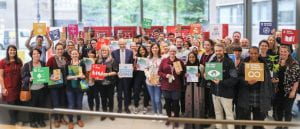
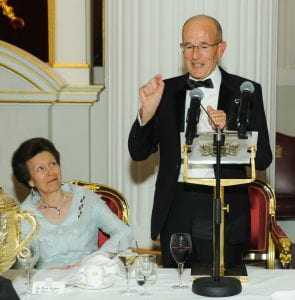
Why did you decide to step down in 2021? What will you do next?
I’ve always felt that being President of City is a great privilege and so the decision to step down was a hard one to take; made all the more difficult as I will be leaving colleagues, students and alumni who mean a lot to me. I took the decision during my tenth year in post, which is about the right length of time to make a sustainable difference.
I know what I won’t be doing next and that is seeking to lead my third university or moving from London. However, I will be continuing as Director and Trustee of the Universities Superannuation Scheme Ltd., President of the Remote Sensing & Photogrammetry Society and Patron of The Conversation UK. Immediately upon on stepping down I will be undertaking research evaluation in the Netherlands as part of the Dutch REF.
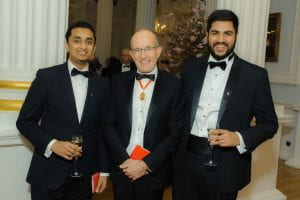
The remainder of 2021 will be taken up by the renovation of our London home; enjoying our new grandson; editing a journal issue on ‘solar-induced chlorophyll fluorescence’ and travelling internationally. Looking forward, I have been fortunate in being asked to consider some fascinating national non-executive posts and I will certainly be pursuing some of those before the summer.
We have an impressive alumni network and many of these alumni have graduated during your time at City. What are your reflections on the lifelong link and special connection between City and its global community of alumni?

I am very proud of our students and not surprisingly I’m very proud of our alumni, many of whom have a genuine affection for City and are now in influential positions in almost every country in the world.
I’m keen for our alumni to see themselves as part of City’s future as well as our past and I’m pleased to say that I’ve enjoyed promoting that message whenever possible. I’ve noted that this affection tends to be a little stronger among those students who spent their formative years with us as undergraduates, either before City’s 1970s property-driven transition to a ‘commuting university’, or during the more recent period of academic and student-centred investment. However, having said that, I can also think of quite a few exceptionally supportive alumni who were postgraduates in the intervening decades. In recent years it has been particularly gratifying for me to see so many of our alumni choosing to help us with student mentoring and fundraising.

What do you see as City’s biggest challenge looking forward?
Our Victorian founders knew that an enduring challenge would be to resist any temptation to serve our own interests, and instead to serve the interests of our students, the pursuit of knowledge, the economy and society. They captured this in our statement of purpose and also our moto, ‘to serve’. The biggest challenge will be to remain inspired by the nobility of our purpose and to live up to that notion of service.
In the immediate post-pandemic world, the biggest challenge will be that of using our academic strength, great campus, the now more welcoming environment for international students and the current rapid upswing in undergraduate applications to support City’s ambition to be a leading global university.
What is your single most memorable moment from your time at City?
Speaking at my first Rector’s (then Chancellor’s) Dinner at Mansion House. It emphasised to me the unique relationship we have with the prestigious and historic City of London and also our well-established place within this great capital City. This event has provided me with a regular reminder that life has conspired to give me the great good fortune to lead this outstanding University for a small part of its history.
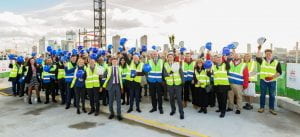
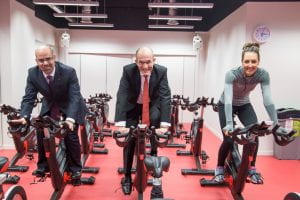
What advice would you give your younger self?
Simply, for once in a while, to live in the moment.
Is there any final comment you would like to make?
I find it difficult to believe that it is almost eleven years since I was appointed as Vice-Chancellor of City. Never has the opening of J P Hartley’s ‘The Go-Between’: ‘The past is a foreign country they do things differently there’ – seemed so apt. Culturally, we were uncomfortably similar to our post-92 neighbours, our finances were unsustainable and colleagues who showed me around were deeply apologetic about our buildings. Our greater academic strength, our increased size (we are now the fourth largest university in London) and our sound finances have been matched by the increased quality of our estate. It has been a particular pleasure to see each of those early estates’ plans, culminating in, for example, City Sport, Northampton Square, Drysdale, the Law School Building and most recently, Finsbury Square.
From this summer, I shall look at City from afar and remind myself that I had the honour to work with such great colleagues, in such an energising location, to both change the life-chances of thousands of people and to increase our understanding of the world.
From my wife, Helen and I – thank you.
On behalf of the entire City community, thank you Sir Paul, for your leadership of City for the past eleven years. Professor Sir Paul Curran will be succeeded by Professor Anthony Finkelstein CBE FREng. Anthony will join City from his position as the Government’s Chief Scientific Adviser for National Security.
